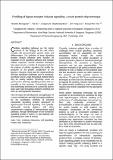Profiling of ligand-receptor induced signalling- a novel protein chip technique
Author(s)
Murugesan, Nivetha; Du, Tai; Stephanopoulos, Gregory; Lee, Jim Yang; Too, Heng-Phon
DownloadMEBCS020.pdf (111.7Kb)
Metadata
Show full item recordAbstract
Cellular signalling pathways are the master controls of the biology of the cell, which includes cell communication, growth, death, and differentiation. The activities of these signalling proteins directly influence gene function by regulation of the signalling pathways that mediate cellular responses. Recent advanced techniques have given rise to a number of emerging tools for the analysis of cellular signalling that profile the proteome or the protein complement of the genome. However, these tools for signal profiling still face significant challenges such as sensitivity, specificity and be a high throughput method before they are widely adopted. Sensitivity issues are paramount in detecting signalling proteins that are normally in low amounts. Conventional protein chip technology promises to be a powerful tool for large scale high-throughput proteome profiling but there are still significant drawbacks.
Here we report the development and application of a novel multiplexed and high-throughput platform for the quantitative profiling of activated intracellular sig nalling proteins subsequent to ligand-receptor induced signalling. This spatially addressable biochip platform will allow comprehensive mapping of interconnected signal pathways, through identification of key functional signalling proteins (‘nodes’) in each pathway and quantifying their state of activity.
Date issued
2004-01Series/Report no.
Molecular Engineering of Biological and Chemical Systems (MEBCS);
Keywords
antibody microarray, cell signalling, protein chip, proteomics